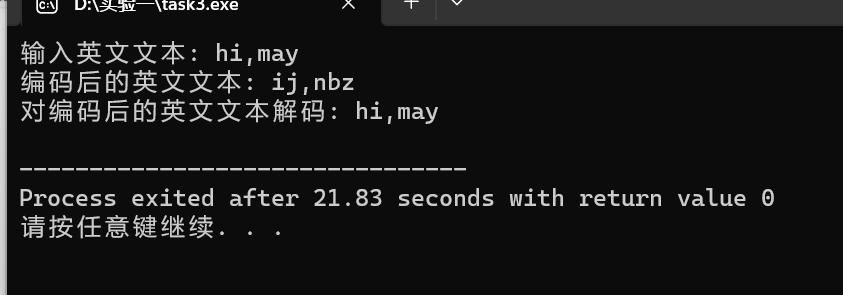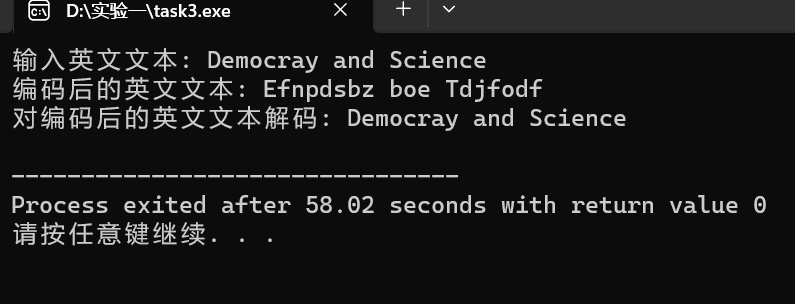实验5
任务 1
1.1程序源码
#include <stdio.h> #include <stdlib.h> #define N 4 int main() { int x[N] = {1, 9, 8, 4}; int i; int *p; for (i = 0; i < N; ++i) printf("%d", x[i]); printf("\n"); system("pause"); return 0; }
程序运行截图:

1.2程序源码
#include <stdio.h> #include <stdlib.h> int main() { int x[2][4]={{1,9,8,4},{2,0,4,9}}; int i,j; int *p; int(*q)[4]; for(i=0;i<2;++i) { for(j=0;j<4;++j) printf("%d",x[i][j]); printf("\n"); } for (p = &x[0][0],i=0;p<&x[0][0]+8;++p,++i) { printf("%d",*p); if((i+1)%4==0) printf("\n"); } for(q=x;q<x+2;++q) { for(j=0;j<4;++j) printf("%d",*(*q+j)); printf("\n"); } system("pause"); return 0; }
程序运行截图:

任务2
程序源码:
#include <stdio.h> #include <stdlib.h> #include <string.h> #define N 80 int main() { char s1[]="learning makes me happy"; char s2[]="learning makes me sleepy"; char tmp[N]; printf("sizeof(s1)vs.strlen(s1); \n"); printf("sizeof(s1)=%d\n",sizeof(s1)); printf("strlen(s1)=%d\n",strlen(s1)); printf("\nbefore swap:\n"); printf("s1:%s\n",s1); printf("s2:%s\n",s2); printf("\nswapping...\n"); strcpy(tmp,s1); strcpy(s1,s2); strcpy(s2,tmp); printf("\nafter swap:\n"); printf("s1:%s\n",s1); printf("s2:%s\n",s2); system("pause"); return 0; }
程序运行截图:
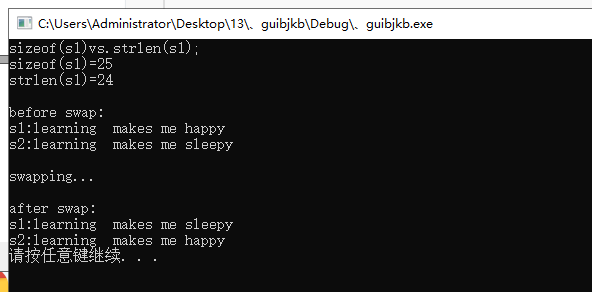
1.24字节 s1所占的字节长度(包括\0) 有效字符串的长度
2.,不能 s1是地址常量,从表达式的角度来说不符合规则
3.交换了
2.2
程序源码:
#include <stdio.h> #include <stdlib.h> #include <string.h> #define N 80 int main() { char *s1="learning makes me happy"; char *s2="learning makes me sleepy"; char *tmp; printf("sizeof(s1)vs.strlen(s1); \n"); printf("sizeof(s1)=%d\n",sizeof(s1)); printf("strlen(s1)=%d\n",strlen(s1)); printf("\nbefore swap:\n"); printf("s1:%s\n",s1); printf("s2:%s\n",s2); printf("\nswapping...\n"); tmp=s1; s1=s2; s2=tmp; printf("\nafter swap:\n"); printf("s1:%s\n",s1); printf("s2:%s\n",s2); system("pause"); return 0; }
程序运行截图:

问题:1.存放的是这组字符串的地址 计算的是该地址所占的字节数 计算的是根据s1的地址寻找到的字符串的有效长度
2.可以,因为s1是一个指针变量,而task2.1中是一个地址常量从规则上说task2.2成立而1不成立
3.交换的是其中保存的地址 没有
任务3
程序源码:
#include<stdio.h> void str_cpy(char*target,const char*source); void str_cat(char*str1,char*str2); int main() { char s1[80],s2[20]="1984"; str_cpy(s1,s2); puts(s1); str_cat(s1,"Animal Farm"); puts(s1); return 0; } void str_cpy(char*target,const char*source) { while(*target++=*source++) ; } void str_cat(char*str1,char*str2) { while(*str1) str1++; while(*str1++=*str2++) ; }
程序运行截图:
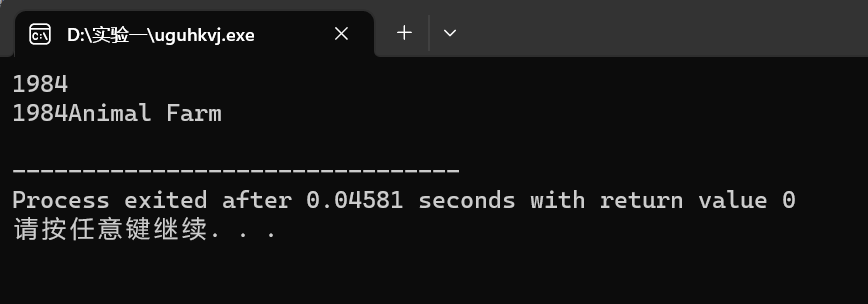
任务4
程序源码:
#include<stdio.h> #define N 80 int func(char*); int main() { char str[80]; while (gets(str)!=NULL) { if (func(str)) printf("yes\n"); else printf("no\n"); } return 0; } int func(char*str) { char*begin,*end; begin=end=str; while(*end) end++; end--; while(begin<end) { if(*begin!=*end) return 0; else { begin++; end--; } } return 1; }
程序运行截图 :
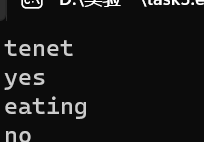
任务5
程序源码:
#include<stdio.h> #define N 80 void func(char*); int main() { char s[N]; while (scanf("%s,",s)!=EOF) { func(s); puts(s); } return 0; } void func(char*str) { int i; char *p1,*p2,*p; p1=str; while(*p1=='*') p1++; p2=str; while(*p2) p2++; p2--; while(*p2=='*') p2--; p=str; i=0; while(p<p1) { str[i]=*p; p++; i++; } while(p<=p2) { if(*p!='*') { str[i]=*p; i++; } p++; } while(*p!='\0') { str[i]=*p; p++; i++; } str[i]='\0'; }
程序运行截图:
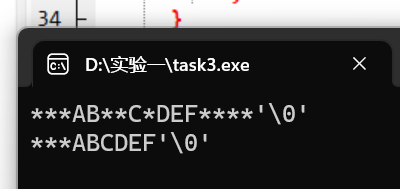
任务6
程序源码:
#include<stdio.h> #include<string.h> void sort(char*name[],int n); int main() { char*course[4]={"C Program", "C++ Object Oriented Program", "Operating System", "Data Structure and Algorithms"}; int i; sort(course,4); for(i=0;i<4;i++) printf("%s\n",course[i]); return 0; } void sort(char*name[],int n) { int i,j; char*tmp; for(i=0;i<n-1;++i) for(j=0;j<n-1-i;++j) if(strcmp(name[j],name[j+1])>0) { tmp=name[j]; name[j]=name[j+1]; name[j+1]=tmp; } }
程序运行截图:
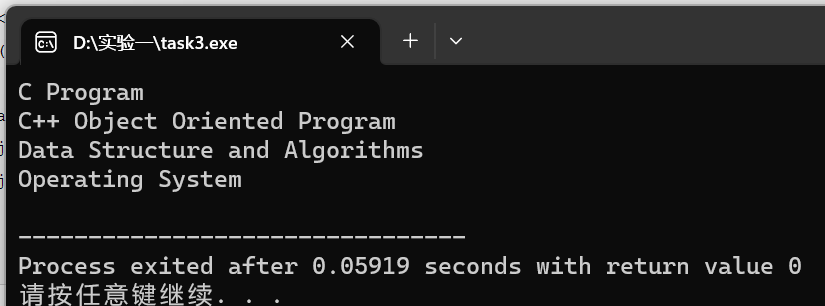
6.2
程序源码:
#include <stdio.h> #include <string.h> void sort(char *name[], int n); int main() { char *course[4] = {"C Program", "C++ Object Oriented Program", "Operating System", "Data Structure and Algorithms"}; int i; sort(course,4); for(i = 0;i<4;i++) printf("%s\n",course[i]); return 0; } void sort(char *name[],int n) { int i,j,k; char *tmp; for(i = 0;i<n-1;i++) { k = i; for(j = i+1;j<n;j++) if(strcmp(name[j],name[k])<0) k = j; if(k != i) { tmp = name[i]; name[i] = name[k]; name[k] = tmp; } } }
程序运行截图:
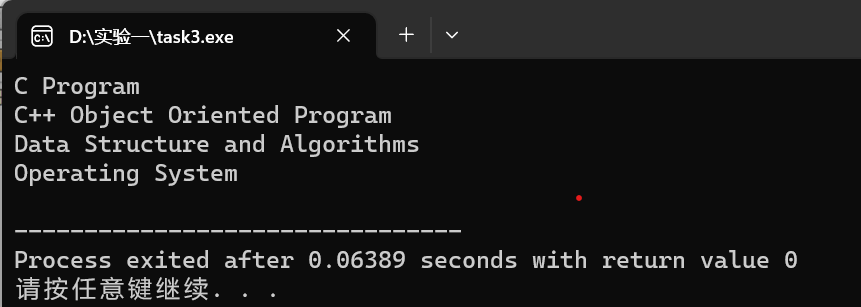
答:交换的是指针变量的值。
任务7
程序源码:
#include <stdio.h> #include <string.h> #define N 5 int check_id(char *str); // 函数声明 int main() { char *pid[N] = {"31010120000721656X", "330106199609203301", "53010220051126571", "510104199211197977", "53010220051126133Y"}; int i; for (i = 0; i < N; ++i) if (check_id(pid[i])) // 函数调用 printf("%s\tTrue\n", pid[i]); else printf("%s\tFalse\n", pid[i]); return 0; } // 函数定义 // 功能: 检查指针str指向的身份证号码串形式上是否合法。 // 形式合法,返回1,否则,返回0 int check_id(char *str) { if(strlen(str)!=18) return 0; else { char *p; p=str; while(*p>='0'&&*p<='9'||*p=='X') p++; if(*p=='\0') return 1; else return 0; } }
程序运行截图:

任务8
程序源码:
#include <stdio.h> #define N 80 void encoder(char *s); // 函数声明 void decoder(char *s); // 函数声明 int main() { char words[N]; printf("输入英文文本: "); gets(words); printf("编码后的英文文本: "); encoder(words); // 函数调用 printf("%s\n", words); printf("对编码后的英文文本解码: "); decoder(words); // 函数调用 printf("%s\n", words); return 0; } /*函数定义 功能:对s指向的字符串进行编码处理 编码规则: 对于a~z或A~Z之间的字母字符,用其后的字符替换; 其中,z用a替换,Z用A替换 其它非字母字符,保持不变 */ void encoder(char *s) {int i; for(i=0;*(s+i)!=0;i++) {if((*(s+i)>=65&&*(s+i)<90)||(*(s+i)>=97&&*(s+i)<122)) {*(s+i)+=1;continue;} if(*(s+i)==90) {*(s+i)=65;continue;} if(*(s+i)==122) {*(s+i)=97;continue;} } } /*函数定义 功能:对s指向的字符串进行解码处理 解码规则: 对于a~z或A~Z之间的字母字符,用其前面的字符替换; 其中,a用z替换,A用Z替换 其它非字母字符,保持不变 */ void decoder(char *s) {int i; for(i=0;*(s+i)!=0;i++) {if(*(s+i)>65&&*(s+i)<=90) {*(s+i)-=1;continue;} if(*(s+i)>97&&*(s+i)<=122) {*(s+i)-=1;continue;} if(*(s+i)==65) {*(s+i)=90;continue;} if(*(s+i)==97) {*(s+i)=122;continue;} } // 补足函数实现 // ××× }
程序运行截图:
